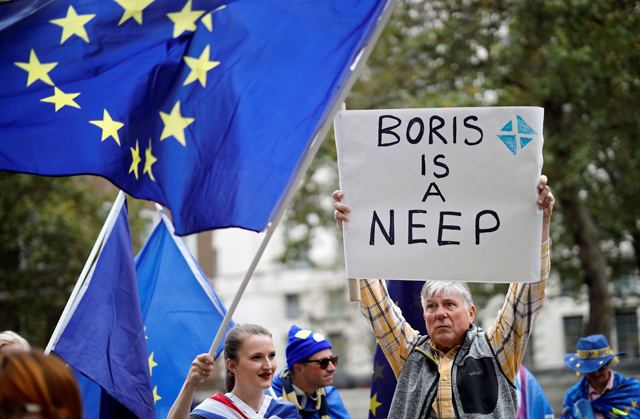LONDON — British Prime Minister Boris Johnson insisted on Tuesday he was working hard to strike a divorce deal with the EU, after he suspended parliament following a series of bruising defeats by MPs over his Brexit plan.
The day after meeting Irish Prime Minister Leo Varadkar in Dublin, Johnson held talks with his Northern Irish allies in London — all key players in the race to secure a deal before Britain leaves the European Union on October 31.
Johnson has faced huge opposition in the house of commons to his threat to leave the bloc without agreeing exit terms with Brussels but lawmakers have also rejected his call for an early general election to resolve the impasse.
Before he suspended parliament early Tuesday, MPs rushed through legislation requiring Johnson to postpone Brexit by three months if he fails to secure a deal at an EU summit on October 17-18.
"We're working very hard to get a deal. I think we will get a deal but if absolutely necessary we will come out with no deal," Johnson said during a school visit on Tuesday.
He has previously said he would rather be "dead in a ditch" than delay Brexit.
Backstop talk
The Conservative leader took office in July promising to renegotiate the exit terms struck by his predecessor, Theresa May, which were rejected three times by MPs.
But the EU has so far refused, and accused London of failing to come up with any viable alternatives to the most controversial element, the so-called backstop plan to keep open the UK's border with the Republic of Ireland.
Johnson met Tuesday with Arlene Foster, the leader of Northern Ireland's Democratic Unionist Party (DUP), which has propped up his government.
There is speculation that Johnson could be softening his demand to remove the backstop from the Brexit deal, although Downing Street denies this — and the DUP would likely resist such a move.
It fears that efforts to keep open the land frontier between Northern Ireland and the Irish Republic to protect the peace process, could lead to a new sea border between Northern Ireland and the British mainland.
Johnson's EU envoy, David Frost, is due back in Brussels later this week for talks.
Meanwhile in London, a cross-party group of MPs met to discuss how they might yet get the old Brexit deal through parliament if Johnson failed to secure a new one.
Conservative rebel Rory Stewart said: "There is only one door out of this problem which is through a majority [for a deal] in parliament."
'Donnez-moi un break'
MPs only returned from their summer holiday last week but rushed through the "no deal" law before the session closed amid dramatic scenes early on Tuesday.
Opposition MPs waved signs reading "Silenced" and hollered "Shame on you!" at government lawmakers as the formal suspension ceremony took place.
Prorogation is normally a routine event every year but Johnson is accused of trying to muzzle lawmakers by doing it for so long — five weeks — and so close to the Brexit deadline.
Commons Speaker John Bercow earlier announced he would be stepping down in a strongly-worded speech in which he warned the government against trying to "degrade" parliament.
In a day of drama, Johnson also lost a vote demanding the government publish confidential papers about the potential impact of a no-deal Brexit.
MPs fear that ending Britain's 46-year-old membership of the EU without agreeing new terms would be hugely disruptive and accuse ministers of downplaying the risk.
Opposition leaders say they will not support Johnson's calls for an early election until this option is off the table.
Johnson rejected criticism of his decision to suspend parliament.
"This stuff about it being anti-democratic — I mean, donnez-moi un break," he said, switching into Franglais.
"We were very, very clear that if people wanted a democratic moment, if they wanted an election, we offered it to the Labour opposition and mysteriously they decided not to go for it."
